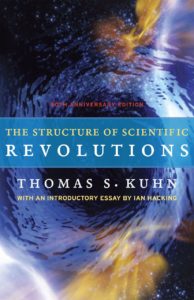From Katya: There’s a generic assumption in academic circles that the humanities are embattled — for funding, for prestige, for influence within the university, etc. — against the BBEG of STEM. STEM is stealing our students. STEM is stealing our funding. STEM is gnawing our legs off (for science!)
As you might guess, I don’t find this boogey man particularly interesting. Some pieces seem accurate, at least based on my personal observations. STEM fields seem to have more access to funding (although their research is much more costly to run than my own) and STEM fields often attract more undergraduate majors largely because they’re seen as more employable (this too is a mixed bag and can depend on many factors beyond the field of study alone. It also doesn’t equally apply to all STEM fields). There’s dozens of other reasons we can dig into on the show – and I’d love to hear listener’s experiences with these or other reasons. I’m glad too that there’s a growing conversation about how universities, regardless of research field, are broken for students and staff alike that seems to be redirecting some of this energy.
What is interesting is the way this perceived split illustrates divergent cultures. Funding and university politics aside, researchers of different fields are trained to see things differently. Confronted with a landscape a geologist and a historian can both tell us something about what has happened there, one by reading the earth itself and the other by consulting human records. A literary scholar might reflect on how a Walt Whitman or an Octavia Butler have narrated the human relationship to natural spaces while an engineer imagines how building a bridge might shift our relationship yet again (with both begging the question, with what consequences?) The methods, fields, and traditions we’re trained in shape how we see things and what we see. To some extent, we perceive a different world because we’ve learned to look, in detail, at the world through very different instruments.
In graduate school, I was an instructor in an interdisciplinary class on “nature” (yep, that broad) taught by faculty from three different departments and me, the weirdo graduate student that played a lot of games and whose favorite writer was a physicist. The entire class became an exercise in overcoming different ways of seeing. I taught Friday sessions with a geology professor – easily the hardest but most interesting teaching I’ve ever done. We had to figure out how to tell the same story in our teaching using both geology and literary perspectives while talking about whatever topic was on deck for that week. What can you see, for example, when you put the geological history of the Raleigh-Durham area alongside a video game adaptation of Walden? A whole lot that neither of use ever thought about from the deep pit of specialization in our own fields.
Each field is good for answering different questions in different contexts. Though one might be more valuable at a given time but that doesn’t mean all other inquiry is useless and to be abandoned (see Thomas Kuhn’s Structure of Scientific Revolutions for a discussion about how dominance of fields shifts within STEM according to cultural forces.) And the knowledge to be gained is so much better and more interesting when you can put the pieces together in one story. My favorite application of this is science fiction (SF) which has always been about putting our knowledge about people (humanities and social sciences!) in conversation with science and technology. (And I will fight anyone with citations that think that Gibson’s “The Gernsback Continuum” is an accurate depiction of SF history. I’m all for carving out a niche but lets be critical about our reading shall we?) As many writers and scholars of the genre have noted, the motivating premise of SF boils down to an experiment in fiction to create speculative knowledge through examining science through the lens of art and literature to generative speculative knowledge to then feed back into other ways of learning about the world (or inventing it!) It illustrates, in art, what can happen when people calm down and figure out how to talk to each other.
We’ll get deeper in our perspectives on this split and how they relate to culture on the show. We’d love to hear from academic folk how they relate to this “split” in fields and from non-academics if these kinds of questions pop up for you in other ways (or if this even means anything to you!) I do ask that we all remember who the real enemies of this conflict are: the business majors. 😉
From Mav: When Katya mentioned this episode I actually thought she wa going to go in any entirely different direction. Though I thinks she makes some good points. That said, I’m perhaps a bit more pessimistic about the divide than she is. I’m certainly not a doomsayer who thinks that there’s an enteral war brewing between philosophers and engineers. But I do think there’s something of a divide between he sciences and the humanities (or I guess the social sciences). Part of this is probably that I’ve spent so much of my career (both before and after returning to academia) trying to walk down the line between the two. And I find myself getting frustrated with both sides and the unwillingness that I often see to “work across the aisle.”
Part of this, I think is tradition and the funding and prestige issue. I’ve definitely witness disparagement from the hard sciences towards the softer ones. There’s an assumption that “well, anyone can do that” which comes from the more technical fields toward the humanities. That SO not true. But I have had people say it to my face. A lot of this comes from a lack of understanding about exactly what cultural studies, philosophy, literary studies, history, political science, rhetoric, or even psychology really is. And by the same token there’s definitely the jealousy of funding and prestige in the other direction… and some amount of assumption that practical sciences are lest academically pure.
I think a large part of the “fight” comes from a reluctance to do the kind of interdisciplinary working together that Katya has been lucky enough to work places that value a lot of. Many projects (I’d venture to say MOST projects) work better with an interdisciplinary approach. There are technical, social, ergonomic, aesthetic, physical, and political considerations to just about everything of value. But experts in one often ignore the ramifications of the other. Or assume they’re minor and meaningless. It’s not really a STEM vs Humanities issue. This happens WITHIN the divisions too. Engineers, information technologists, programmers, and computer scientists argue about who is more valuable and who is useless while people outside of the tech industry say “wait, those are four separate jobs”? And I’ve heard tons of literary theorists, cultural theorists, semioticians, political scientists and sociologists argue that the other three fields are useless… and I defy you to tell the difference if you don’t have a degree in one of them.
I really and truly think that in both academia and in industry a lot of people just truly don’t understand what people in other fields actually DO. And then they take their assumptions based on that misunderstanding and their own expertise and just dunning-kruger themselves into a fever. I’ve been in SOOOO many conversations where an expert in one field assumes something completely incorrect that a 101 understanding in another field would have taught them the truth of. And that goes against BOTH hard and soft sciences (and by the way, if you’re actually trying to distinguish value based on those terms, you’ve already lost).
Also… yeah, a lot of it is money. With English programs losing funding despite having to serve entire academic institutions, it can be upsetting to hear about a bajillion dollar grant for one professor to study mold. But like Katya said, this is born of people not understanding where that money goes. But I’d offer that it works the other way too. Humanities departments suffer because people don’t understand what THEY do either. And there’s a bit of holier-than-thou resistance from humanities to keep it pure and not adapt.
But I think a lot of this also comes from impressions from he general public. The Boomers taught their children that the most valuable people are scientists. The GenXers had the bright idea of calling it STEM thus deepening the divide. And now some Millennials are trying to move the needle a touch by adding an Arts for STEAM. That leaves the humanities out in the cold. I guess we could make it SHTEAM or something? But then what the fuck is the acronym even for now? Like everything else in capitalist systems… value is created not by what you have but by what you have and other’s don’t.
Anyway… Like Katya said we want to know what you think! Is there a divide in Stem vs Humanities? Does it serve a purpose? Is it just nerds fighting about meaningless drivel? Does any of this matter in the gig economy where in 2 years the only remaining job is going to be delivering UberEats to each other? Can’t we all just get along? Let u know in the comments.










@katyagorecki @chrismaverick Well, yes, of course, because they involve humans, and we frickin’ LOVE be… https://t.co/cy5okV53Jy
Well, yes, of course, because they involve humans, and we frickin’ LOVE being at war. I have to reject the premise, unfortunately, as I think that if these are definable fields, they overlap a LOT.
@katyagorecki @chrismaverick Does Dr. Strange represent the humanities here? I could see that. I mean,… https://t.co/Xym55gPDDZ
Does Dr. Strange represent the humanities here? I could see that. I mean, he was an MD, but he very dramatically switched majors after that.
So I don’t explain it in the post. But my reasoning for picking the image was that both strange and doom specifically represent double majors (or switches) in both stem and humanities. So great guess!
Yes… agreed about the overlap. To be fair, we address that a lot in the actual blog. But I tend to make the @voxpopcast tweets clearer questions… maybe I’m becoming to clickbaity….
Or – and I’m spitballing here – I’m a pedant. 😉 It IS an interesting question, though. I just listened to the first six episodes of the ‘pod today, and I’m looking forward to the remaining 190. I’ll catch up with this one in … April, if my stats are right.
Awesome. Welcome aboard. I hope we’re not too insane. After doing almost 200 of these o question everything we’ve said more than a week ago. 😄 so feel free to skip around.
I probably won’t. Some nights I STILL wake up at night annoyed that, due to a glitch in my copy of the game, I only got 99% completion in LEGO Harry Potter. It’s a kind offer, though.
Cool! As more attention is generally given to Doom’s science studies and he’s usually Reed’s opposite number instead of Strange’s, I generally think of Doom more from the STEM perspective. But it is intriguing that both characters have experimented with both science and sorcery.